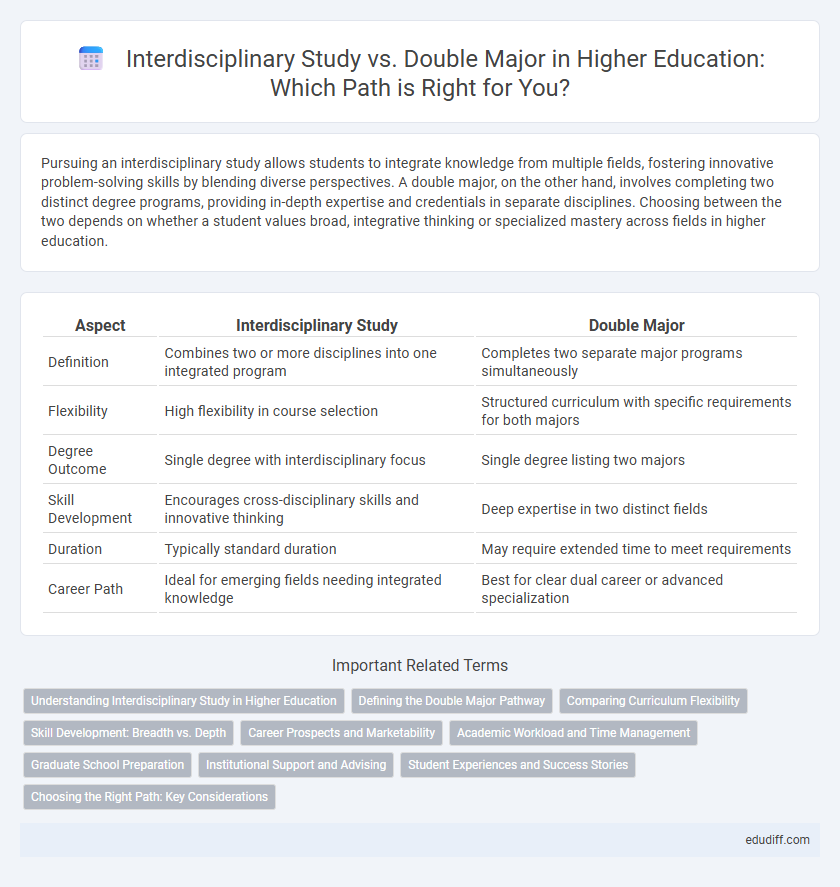Pursuing an interdisciplinary study allows students to integrate knowledge from multiple fields, fostering innovative problem-solving skills by blending diverse perspectives. A double major, on the other hand, involves completing two distinct degree programs, providing in-depth expertise and credentials in separate disciplines. Choosing between the two depends on whether a student values broad, integrative thinking or specialized mastery across fields in higher education.
Table of Comparison
| Aspect | Interdisciplinary Study | Double Major |
|---|---|---|
| Definition | Combines two or more disciplines into one integrated program | Completes two separate major programs simultaneously |
| Flexibility | High flexibility in course selection | Structured curriculum with specific requirements for both majors |
| Degree Outcome | Single degree with interdisciplinary focus | Single degree listing two majors |
| Skill Development | Encourages cross-disciplinary skills and innovative thinking | Deep expertise in two distinct fields |
| Duration | Typically standard duration | May require extended time to meet requirements |
| Career Path | Ideal for emerging fields needing integrated knowledge | Best for clear dual career or advanced specialization |
Understanding Interdisciplinary Study in Higher Education
Interdisciplinary study in higher education integrates knowledge and methods from multiple disciplines, fostering comprehensive problem-solving skills and innovative thinking. Unlike a double major, which requires fulfilling separate requirements for two distinct fields, interdisciplinary programs emphasize synthesis and collaboration across traditional academic boundaries. This approach prepares students for complex global challenges by promoting adaptability and a holistic understanding of diverse subject areas.
Defining the Double Major Pathway
The double major pathway involves completing two distinct fields of study within a single degree program, allowing students to gain specialized expertise in both areas. This approach emphasizes depth and credentialing in two related or unrelated disciplines, often requiring coordinated course planning to meet the requirements of both majors. Unlike interdisciplinary study, which integrates multiple disciplines into a cohesive curriculum, the double major maintains clear departmental distinctions and separate academic identities.
Comparing Curriculum Flexibility
Interdisciplinary study offers greater curriculum flexibility by allowing students to blend courses from multiple disciplines tailored to their specific interests, fostering a customized academic experience. In contrast, a double major requires completion of two distinct sets of degree requirements, often resulting in a more structured and rigid course load. Universities like Stanford and University of Michigan emphasize that interdisciplinary programs promote innovation and adaptability, whereas double majors guarantee depth in two separate fields.
Skill Development: Breadth vs. Depth
Interdisciplinary study fosters breadth in skill development by integrating diverse disciplines, encouraging adaptability, creative problem-solving, and cross-functional knowledge. Double majors promote depth, allowing focused expertise in two specific fields, enhancing specialized theoretical understanding and technical proficiency. Choosing between them depends on career goals, with interdisciplinary paths suited for innovation-driven roles and double majors ideal for specialized professions.
Career Prospects and Marketability
Interdisciplinary study cultivates versatile problem-solving skills and adaptability by integrating knowledge from multiple disciplines, enhancing career prospects in emerging, innovative fields. Double majors demonstrate depth and expertise in two distinct areas, increasing marketability for specialized roles requiring comprehensive subject mastery. Employers often value interdisciplinary graduates for creativity and agility, while double majors attract opportunities demanding dual proficiency and focused academic credentials.
Academic Workload and Time Management
Interdisciplinary Study integrates multiple disciplines into a unified curriculum, demanding consistent synthesis and wider knowledge application, which increases cognitive complexity without necessarily extending credit hours. Double Major requires fulfilling the complete course requirements of two separate fields, often resulting in a heavier credit load and tighter scheduling constraints, affecting time management more acutely. Students pursuing either path must strategically allocate study time and prioritize tasks to balance course intensity and maintain academic performance.
Graduate School Preparation
Interdisciplinary study cultivates the ability to integrate diverse academic perspectives and methodologies, enhancing critical thinking and problem-solving skills valued in graduate programs. A double major demonstrates depth in two distinct fields, signaling strong discipline-specific expertise and academic rigor. Graduate school admissions often favor candidates who showcase both the breadth from interdisciplinary approaches and the specialized knowledge from double majors, depending on the program's focus.
Institutional Support and Advising
Institutions offering interdisciplinary study often provide dedicated advising teams specializing in cross-departmental curriculum planning, enhancing student support through customized academic pathways. Double major programs typically rely on separate departmental advisors, which may lead to less coordinated guidance but greater depth in each discipline. Robust institutional support for interdisciplinary students includes integrated advising platforms and faculty collaboration, optimizing academic success and degree completion efficiency.
Student Experiences and Success Stories
Students pursuing interdisciplinary studies often report enhanced critical thinking and problem-solving skills by integrating knowledge across diverse fields. Double major students benefit from deeper expertise in two distinct disciplines, leading to expanded career opportunities and academic recognition. Success stories highlight increased adaptability and innovative perspectives as key outcomes of both academic paths.
Choosing the Right Path: Key Considerations
Evaluating academic goals and career aspirations plays a crucial role when choosing between interdisciplinary study and a double major, as interdisciplinary programs foster integrative thinking across fields while double majors provide in-depth expertise in two distinct disciplines. Factors such as curriculum flexibility, workload intensity, and opportunities for research or internships should guide decision-making, with interdisciplinary study favoring breadth and innovation, and double majors emphasizing specialization and marketability. Prospective students must consider institutional offerings and advisor support to align their education pathway with future professional objectives effectively.
Interdisciplinary Study vs Double Major Infographic

 edudiff.com
edudiff.com